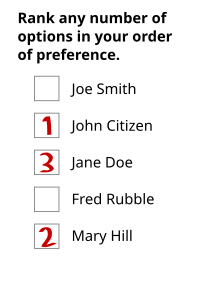
Proportional representation (PR) refers to any type of electoral system under which subgroups of an electorate are reflected proportionately in the elected body. The concept applies mainly to political divisions among voters. The essence of such systems is that all votes cast – or almost all votes cast – contribute to the result and are effectively used to help elect someone – not just a bare plurality or (exclusively) the majority – and that the system produces mixed, balanced representation reflecting how votes are cast.

The single transferable vote (STV) is a multi-winner electoral system in which each voter casts a single vote in the form of a ranked-choice ballot. Voters have the option to rank candidates, and their vote may be transferred according to alternate preferences if their preferred candidate is eliminated or elected with surplus votes, so that their vote is used to elect someone they prefer over others in the running. STV aims to approach proportional representation based on votes cast in the district where it is used, so that each vote is worth about the same as another.

The House of Representatives is the lower house of the bicameral Parliament of Australia, the upper house being the Senate. Its composition and powers are set down in Chapter I of the Constitution of Australia.
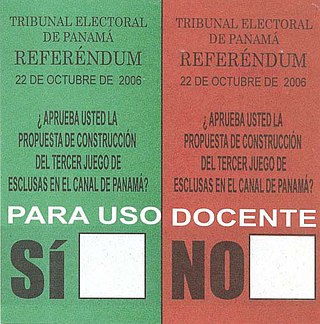
Voting is a method by which a group, such as a meeting or an electorate, convenes together for the purpose of making a collective decision or expressing an opinion usually following discussions, debates or election campaigns. Democracies elect holders of high office by voting. Residents of a jurisdiction represented by an elected official are called "constituents", and the constituents who choose to cast a ballot for their chosen candidate are called "voters." There are different systems for collecting votes, but while many of the systems used in decision-making can also be used as electoral systems, any which cater to proportional representation can only be used in elections.
Cumulative voting is a multiple-winner method intended to promote more proportional representation than winner-take-all elections such as block voting or first past the post. Cumulative voting is used frequently in corporate governance, where it is mandated by some (7) U.S. states.
The electoral system of Australia comprises the laws and processes used for the election of members of the Australian Parliament and is governed primarily by the Commonwealth Electoral Act 1918. The system presently has a number of distinctive features including compulsory enrolment; compulsory voting; majority-preferential instant-runoff voting in single-member seats to elect the lower house, the House of Representatives; and the use of the single transferable vote proportional representation system to elect the upper house, the Senate.

Open list describes any variant of party-list proportional representation where voters have at least some influence on the order in which a party's candidates are elected. This is as opposed to closed list, in which party lists are in a pre-determined, fixed order by the time of the election and gives the general voter no influence at all on the position of the candidates placed on the party list.
"None of the above" (NOTA), or none for short, also known as "against all" or a "scratch" vote, is a ballot option in some jurisdictions or organizations, designed to allow the voter to indicate disapproval of the candidates in a voting system. It is based on the principle that consent requires the ability to withhold consent in an election, just as they can by voting "No" on ballot questions. It must be contrasted with "abstention", in which a voter does not cast a ballot.

The Family First Party was a conservative political party in Australia which existed from 2002 to 2017. It was founded in South Australia where it enjoyed its greatest electoral support. Since the demise of the Australian Conservatives into which it merged, it has been refounded in that state as the Family First Party (2021), where it contested the state election in 2022, but failed to win a seat.
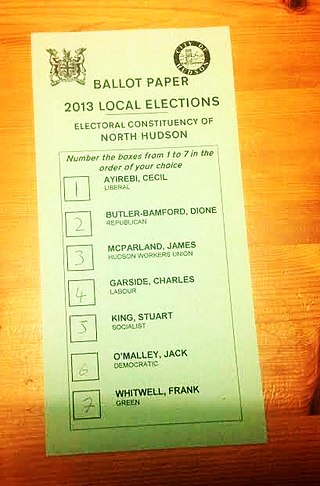
In electoral systems which use ranked voting, a donkey vote is a cast ballot where the voter ranks the candidates based on the order they appear on the ballot itself. The voter that votes in this manner is referred to as a donkey voter.
Historically, the single transferable vote (STV) electoral system has seen a series of relatively modest periods of usage and disusage throughout the world; however, today it is seeing increasing popularity and proposed implementation as a method of proportional representation and a goal of electoral reform. STV has been used in many different local, regional and national electoral systems, as well as in various other types of bodies, around the world.

The Libertarian Party, formerly known as the Liberal Democratic Party (LDP), is an Australian political party founded in Canberra in 2001. The party espouses smaller government and supports policies that are based on classical liberal, libertarian principles, such as lower taxes, opposing restrictions on civil liberties, decentralisation, uranium mining, and the relaxation of smoking laws.
A nonpartisan blanket primary is a primary election in which all candidates for the same elected office run against each other at once, regardless of the political party. Partisan elections are, on the other hand, segregated by political party. Nonpartisan blanket primaries are slightly different from most other elections systems with two rounds/a runoff, also known as "jungle primaries" , in a few ways. The first round of a nonpartisan blanket primary is officially the "primary." Round two is the "general election." Round two must be held, even if one candidate receives a majority in the first round.
Instant-runoff voting (IRV) is a voting method used in single-seat elections with more than two candidates. Instead of voting only for a single candidate, voters in IRV elections can rank the candidates in order of preference. Ballots are initially counted for each elector's top choice, losing candidates are eliminated, and ballots for losing candidates are redistributed until one candidate is the top remaining choice of a majority of the voters. When the field is reduced to two, it has become an "instant runoff" that allows a comparison of the top two candidates head-to-head.

The Traditional Unionist Voice (TUV) is a unionist political party in Northern Ireland. In common with all other Northern Irish unionist parties, the TUV's political programme has as its sine qua non the preservation of Northern Ireland's place within the United Kingdom. A founding precept of the party is that "nothing which is morally wrong can be politically right".
The Borda count is a family of positional voting rules which gives each candidate, for each ballot, a number of points corresponding to the number of candidates ranked lower. In the original variant, the lowest-ranked candidate gets 0 points, the next-lowest gets 1 point, etc., and the highest-ranked candidate gets n − 1 points, where n is the number of candidates. Once all votes have been counted, the option or candidate with the most points is the winner. The Borda count is intended to elect broadly acceptable options or candidates, rather than those preferred by a majority, and so is often described as a consensus-based voting system rather than a majoritarian one.
Instant-runoff voting (IRV), also known as plurality with elimination or plurality loser, is a ranked-choice voting system that modifies plurality by repeatedly eliminating the last-place winner until only one candidate is left. In the United Kingdom, it is generally called the alternative vote (AV). In the United States, IRV is often conflated with ranked-choice voting (RCV); however, this conflation is not completely standard, and social choice theorists tend to prefer more explicit terms.

The United Kingdom Alternative Vote referendum, also known as the UK-wide referendum on the Parliamentary voting system was held on Thursday 5 May 2011 in the United Kingdom (UK) to choose the method of electing MPs at subsequent general elections. It occurred as a provision of the Conservative–Liberal Democrat coalition agreement drawn up in 2010 and also indirectly in the aftermath of the 2009 expenses scandal. It operated under the provisions of the Parliamentary Voting System and Constituencies Act 2011 and was the first national referendum to be held under provisions laid out in the Political Parties, Elections and Referendums Act 2000.
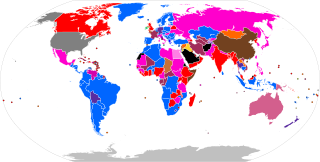
An electoral system or voting system is a set of rules that determine how elections and referendums are conducted and how their results are determined. Electoral systems are used in politics to elect governments, while non-political elections may take place in business, non-profit organisations and informal organisations. These rules govern all aspects of the voting process: when elections occur, who is allowed to vote, who can stand as a candidate, how ballots are marked and cast, how the ballots are counted, how votes translate into the election outcome, limits on campaign spending, and other factors that can affect the result. Political electoral systems are defined by constitutions and electoral laws, are typically conducted by election commissions, and can use multiple types of elections for different offices.
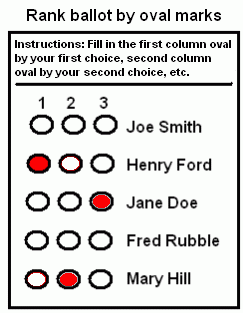
The term ranked voting, also known as preferential voting or ranked-choice voting, pertains to any voting system where voters indicate a rank to order candidates or options—in a sequence from first, second, third, and onwards—on their ballots. Ranked voting systems vary based on the ballot marking process, how preferences are tabulated and counted, the number of seats available for election, and whether voters are allowed to rank candidates equally.
